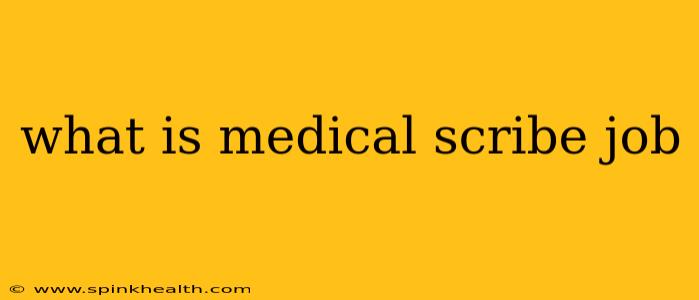What is a Medical Scribe Job? A Day in the Life and Beyond
The whirring of the EKG machine, the hurried pace of the hospital hallway, the urgent whispers of a doctor reviewing a chart – this is the backdrop to the often-unsung hero of modern medicine: the medical scribe. But what exactly is a medical scribe job? It's more than just taking notes; it's about being a crucial part of the healthcare team, streamlining workflows, and ultimately, improving patient care.
Imagine this: You're in a busy doctor's office or hospital ward, working alongside a physician. The doctor is conducting patient examinations, ordering tests, and dictating notes – all while managing multiple patients and juggling a complex electronic health record (EHR) system. That's where you, the medical scribe, come in. You're their right hand, efficiently documenting every detail of the patient encounter in real-time.
What Does a Medical Scribe Do?
Your primary role is to meticulously record the physician's actions and findings during patient visits. This includes:
- Charting Patient History: Taking detailed notes on patient's medical history, current symptoms, allergies, medications, and family history.
- Documenting Physical Examinations: Recording the doctor's observations during the physical exam, including vital signs, auscultation findings, and neurological assessments.
- Transcribing Physician's Dictations: Accurately recording the doctor's verbal notes, diagnoses, treatment plans, and orders.
- Entering Data into EHR Systems: Entering all collected information into the electronic health record, ensuring accuracy and completeness.
- Assisting with Administrative Tasks: This might include scheduling appointments, managing referrals, or handling phone calls. The specific tasks vary depending on the setting.
Essentially, you are the doctor's personal "memory" and "typing pool," freeing them to focus on patient interaction and diagnosis.
What are the Benefits of a Medical Scribe Career?
Beyond the day-to-day tasks, a career as a medical scribe offers several compelling benefits:
- Exposure to the Medical Field: It's an excellent stepping stone for anyone considering a career in healthcare, providing invaluable hands-on experience.
- Skill Development: You'll develop strong medical terminology, charting skills, and attention to detail, all highly transferable skills.
- Career Advancement Opportunities: Many scribes move on to medical assistant roles, nursing school, or other healthcare professions.
- Competitive Salary: Medical scribe salaries are generally competitive, particularly considering the entry-level nature of the position.
- Fast-Paced and Engaging Work Environment: No two days are ever the same, offering constant learning and a dynamic workplace.
What Skills and Qualifications Do I Need to Be a Medical Scribe?
While formal education isn't always required, several skills are highly valued:
- Excellent Typing Skills: Speed and accuracy are essential for efficient note-taking.
- Strong Medical Terminology Knowledge: A solid understanding of medical terms is crucial for accurate documentation.
- Exceptional Listening and Observation Skills: You must be able to listen attentively to the doctor and observe patient interactions.
- Detail-Oriented Nature: Accuracy is paramount in medical documentation.
- Ability to Work Under Pressure: Busy clinical settings require adaptability and the ability to manage multiple tasks simultaneously.
What are the Different Types of Medical Scribe Jobs?
The medical scribe field offers various work settings, including:
- Inpatient Scribes: Working within hospitals, typically in emergency rooms, inpatient units, or specific medical specialties.
- Outpatient Scribes: Working in doctor's offices or clinics, focusing on documenting patient visits in various specialties.
- Emergency Room Scribes: Focusing solely on documenting patient encounters within a fast-paced ER environment.
- Specialty-Specific Scribes: Working with physicians in specific areas like cardiology, orthopedics, or dermatology.
Is Medical Scribing a Good Career Path for Me?
If you're detail-oriented, possess strong communication skills, and have an interest in medicine, a career as a medical scribe could be a perfect fit. It offers a unique blend of challenging work, valuable learning opportunities, and a direct impact on patient care. It's a stepping stone to a rewarding career in the healthcare field.
How do I become a medical scribe?
This generally involves completing an online course or certification program focusing on medical terminology and documentation. Some employers may offer on-the-job training. You'll want to highlight your strong typing skills and attention to detail in your application.
This comprehensive look at the medical scribe job should give you a much clearer understanding of this important and growing role in healthcare.

